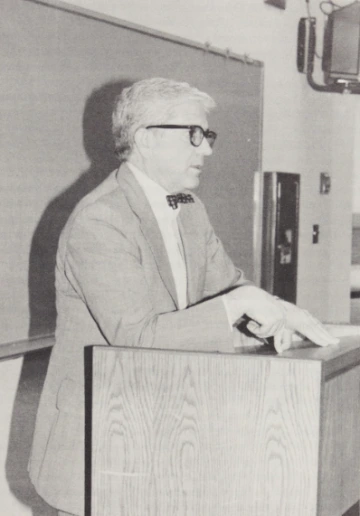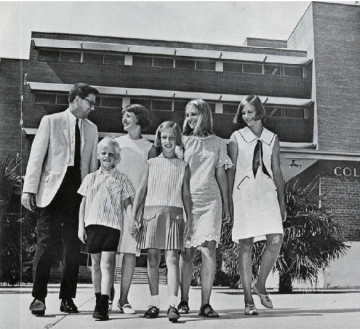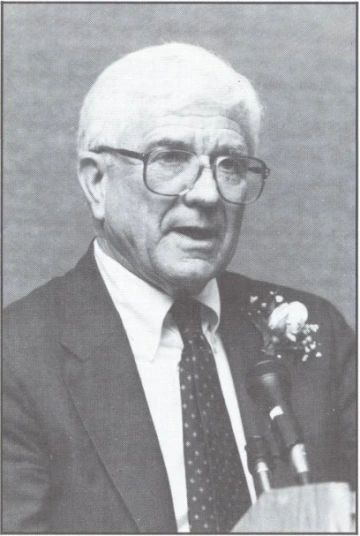
Charles Ares speaking in front of a classroom podium (date unknown).
Arizona Board of Regents on Behalf of the University of Arizona. Digitized by the Daniel F. Cracchiolo Law Library.
DEAN CHARLES E. ARES: 1966-1973
Before Arizona Law
Charles E. Ares was born at St. Mary’s Hospital in Tucson, Arizona, on September 11, 1926, to Grace and Albert Ares, a French-Canadian immigrant and farmer. Ares was the youngest of six children, three girls and three boys. [1]
Ares graduated from Tucson High School in 1943.[2] He served in the United States Navy during World War II[3] from 1944-1946.[4] After his military service, Ares attended the University of Arizona and was the first member of his family to graduate from college.[5] He received his bachelor’s degree in political science in 1949 and his juris doctor in 1952,[6] graduating second in his law school class.[7] While at Arizona Law, Ares served as the president of the Student Bar Association.[8] In 1951, Ares and Henry Kiker, Jr. won the National Inter-Law School Moot Court Competition, beating Georgetown University in the final round.[9] At the invitation of Dean Lyons, Ares served as a student librarian while he attended Arizona Law.[10]
In 1952, Ares clerked for U.S. Supreme Court Justice William O. Douglas.[11] Ares served as the Deputy County Attorney for Tucson in 1953 and became a member of the Arizona State Bar that same year.[12] He was a partner at Udall & Udall law firm from 1956-1960.[13] Udall & Udall began as a tort defense firm in 1952, expanded to offer many legal services, and is still an active law firm today.[14] Ares enjoyed working at Udall & Udall and declined more lucrative opportunities.[15] Ares frequently provided pro bono criminal legal services for before the public defender offices were established.[16] Ares was also a cooperating attorney with ACLU and was part of the 1959 landmark case, Oyama v. O’Neill, that allowed interracial marriages in Arizona.[17]
In 1961, Ares entered the legal academy. He was hired as an associate professor of law at New York University and advanced to full professor by 1965.[18] Ares taught one of the first courses on poverty and law at NYU.[19]
Tenure as Dean

Charles, Ron, Jean, Nancy, Amy, and Marna Ares walking in front of the University of Arizona College of Law, 1966.
The Law College Association of the University of Arizona.
In 1966, Ares returned to the University of Arizona to serve as dean of the College of Law.[20] Dean Ares made substantial changes to the law school during his tenure by hiring new faculty, recommending salary increases, instituting higher admission standards, diversifying the student body, expanding the legal curriculum and library collections,[21] and placing educational emphases on Latin American and natural resources law.[22] Ares is also remembered for prioritizing “civil liberties, social and educational equity.”[23]
After Ares’ first year as dean, he actively recruited faculty members and encouraged visiting professors who would bring new legal perspectives to the University of Arizona.[24] Ares convinced the university to give the faculty salary increases after presenting salary data from 12 neighboring and peer law schools that illustrated University of Arizona was not offering competitive compensation.[25] Ares and the faculty made major academic modifications to the law school by updating the curriculum, adding seminars and new courses, establishing a writing program, and increasing admission standards.[26] Ares also established the Law College Association.[27]
In addition to his role as dean, Ares was a member of the Association of American Law Schools.[28] He served on the Advisory Committee of the Carnegie Commission and represented the small public law school perspective. The intent of the committee was to study new directions in legal education.[29]
Ares worked with Arizona State University law school Dean Bill Pedric to ensure that UA and ASU provided similar admission standards.[30] Ares sought to expand the enrollment of students from under-represented groups and did so with intentional recruiting events, such as co-sponsoring a summer institute at ASU.[31] Ares also appealed to the Pima County Bar Association about increasing minority group membership.[32] Ares supported the enrollment of minority students through the Council of Legal Education Opportunity (CLEO).[33] He admitted more students of color and women than many of the nation’s law schools.[34]
Ares developed a reputation as a “radical” due to his ideas and activism about criminal reform, poverty, and law.[35]When tempers were elevated and demonstrators demanded the law school close in 1969, Ares eased tensions by recommending a convocation about the Vietnam War where all parties could speak.[36] Ares once said, “It is necessary for the law school to be involved in the life of the community.”[37]
Ares believed that law schools should be concerned with how the law impacted those in poverty and society. Critics said that the law school was “...overly concerned with social problems” under Ares’ leadership.[38] However, Ares felt that the modifications he made to the College of Law were inevitable.[39]
Today we consider Ares a visionary who made the necessary changes for the betterment of our world.
Retirement and Beyond
Before his retirement as dean, University of Arizona President John Schaefer commended Ares for his achievements and remarked that Ares revitalized the law school.[40] Students remembered Dean Ares for encouraging them to express their thoughts and be active in decisions that pertained to the College of Law, which instilled confidence in the student body and improved the academic environment.[41]

Charles Ares speaking at his retirement party, 1992.
Robert Walker University of Arizona photograph collection, MS 475, courtesy of University of Arizona Libraries, Special Collections.
Ares resigned as dean in September 1973[42] but remained a central figure on campus.[43] Following his resignation, Ares decided to teach and conduct research full-time. He enjoyed these activities and found them more rewarding than administrative duties.[44] From 1974-1975, Ares took a sabbatical and taught ethics and professional responsibility courses at Harvard University as a visiting professor.[45] Afterwards, he returned to Arizona Law and was recognized as a distinguished teacher by the University of Arizona Foundation in the late 1970s.[46]
Ares was active in a variety of organizations. He contributed to the American Bar Association’s study of Minimum Standards for Criminal Justice and chaired the Arizona State Bar committee that launched a project to alter the Arizona Rules of Criminal Procedure.[47] Ares also worked with the National Institute of Trial Advocacy.[48] He taught courses on civil procedure, constitutional law, and law and psychiatry.[49] In 1988, Ares served as a Pima County Superior Court Judge while on sabbatical.[50]
Ares was involved with the University of Arizona for over 70 years,[51] 50 of which were on the law faculty.[52] Ares received a Lifetime Achievement Award for his commitment and dedication to the College of Law in 1999.[53] Ares’ guidance and counsel aided many.[54] He was admired for his “intellectual influence,” as well as his “…integrity, wisdom, modesty, courage, and [selflessness].”[55]
On campus, Ares’ legacy is celebrated with the Ares Fellows Writing Program, the Charles E. Ares Professorship, and the Charles and Jean Ares Scholarship, which was established in 2017.[56] Ares died on April 29, 2020, [57] at 93 years old. He was survived by his wife, Jean, and four children.[58]
-- Tanya Furlong (’26)
[1] James McNulty, Interview with Charles E. Ares (Arizona Historical Society, 1988) at iv; audio available from the Ariz. Foundation for Legal Services and Education. See also, Dale A. Danneman, Oral History of Charles E. Ares (Law College Assn., 2011) at 1.
[2] In Memoriam: Charles E. Ares, Univ. of Ariz. News, May 11, 2020.
[3] Id.
[4] James McNulty, Interview with Charles E. Ares (Arizona Historical Society, 1988) at iv; audio available from the Ariz. Foundation for Legal Services and Education.
[5] Id.
[6] In Memoriam: Charles E. Ares, Univ. of Ariz. News, May 11, 2020.
[7] James McNulty, Interview with Charles E. Ares (Arizona Historical Society, 1988) at 15; audio available from the Ariz. Foundation for Legal Services and Education.
[8] Michael Cudahy, Dean Explains Decision, 7(1) Ariz. Advocate 1 (Sept. 1972).
[9] John D. Lyons, The First Fifty Years of the College of Law, 7 Ariz. L. Rev. 173, 180 (1966).
[10] Dale A. Danneman, Oral History of Charles E. Ares (Law College Assn., 2011) at 55. See also, Charles Ares, John D. Lyons, A Tribute, 2(2) Univ. of Ariz. Law Record 2-3 (Fall/Winter 1981), wherein Ares describes Dean Lyons’ act of kindness when Lyons “found me a job in the Law Library when the arrival of our first baby required some part-time work that wouldn't take me too far from my studies.”
[11] In Memoriam: Charles E. Ares, Univ. of Ariz. News, May 11, 2020.
[12] James McNulty, Interview with Charles E. Ares (Arizona Historical Society, 1988) at iv; audio available from the Ariz. Foundation for Legal Services and Education.
[13] Dale A. Danneman, Oral History of Charles E. Ares (Law College Assn., 2011) at 140.
[15] Dale A. Danneman, Oral History of Charles E. Ares (Law College Assn., 2011) at 126.
[16] James McNulty, Interview with Charles E. Ares (Arizona Historical Society, 1988) at 61; audio available from the Ariz. Foundation for Legal Services and Education. See also, Dale A. Danneman, Oral History of Charles E. Ares (Law College Assn., 2011) at 147.
[17] Dale A. Danneman, Oral History of Charles E. Ares (Law College Assn., 2011) at 177. See also 50 years ago: Tucson couple broke down barriers to interracial marriage, Ariz. Capitol Times, November 1, 2009. Oyama v. O’Neill, No. 61269 (Ariz. Super. Ct. Dec. 23, 1959).
[18] Dale A. Danneman, Oral History of Charles E. Ares (Law College Assn., 2011) at 120.
[19] Id at 186.
[20] Id at 184.
[21] James McNulty, Interview with Charles E. Ares (Arizona Historical Society, 1988) at 49, 64; audio available from the Ariz. Foundation for Legal Services and Education. See also Letter from Dean Charles Ares to President Harvill, June 24, 1970, Re: Four-Year Report College of Law, at 7-8 (on file with Univ. of Ariz. Law Library, CRG Collections).
[22] Letter from Dean Charles Ares to President Harvill, June 24, 1970, Re: Four-Year Report College of Law, at 7, 14 (on file with Univ. of Ariz. Law Library, CRG Collections).
[23]Univ. of Ariz., James E. Rogers College of Law, Dean Emeritus Charles Ares, YouTube Video, 3:11-3:15 (minutes), published November 2, 2016.
[24] Dale A. Danneman, Oral History of Charles E. Ares (Law College Assn., 2011) at 167.
[25] Letter from Dean Charles Ares to President Richard Harvill, June 24, 1970, Re: Four-Year Report College of Law, at 19-20 (on file with Univ. of Ariz. Law Library, CRG Collections).
[26] Dale A. Danneman, Oral History of Charles E. Ares (Law College Assn., 2011) at 41. See also, Letter from Dean Charles Ares to President Richard Harvill, June 24, 1970, Re: Four-Year Report College of Law (on file with Univ. of Ariz. Law Library, CRG Collections).
[27] Letter from Dean Charles Ares to President Richard Harvill, June 24, 1970, Re: Four-Year Report College of Law, at 3 (on file with Univ. of Ariz. Law Library, CRG Collections).
[28] Id.
[29] James McNulty, Interview with Charles E. Ares (Arizona Historical Society, 1988) at 200-201; audio available from the Ariz. Foundation for Legal Services and Education.
[30] James McNulty, Interview with Charles E. Ares (Arizona Historical Society, 1988) at 48; audio available from the Ariz. Foundation for Legal Services and Education. See also, Dale A. Danneman, Oral History of Charles E. Ares (Law College Assn., 2011) at 227.
[31] Letter from Dean Charles Ares to President Harvill, June 24, 1970, Re: Four-Year Report College of Law (on file with Univ. of Ariz. Law Library, CRG Collections).
[32] Dale A. Danneman, Oral History of Charles E. Ares (Law College Assn., 2011) at 226.
[33] Ariz. Daily Star, March 14, 1968.
[34] Remembering Former Dean, Professor Emeritus Charles Ares, Univ. of Ariz. News, May 13, 2020.
[35] Dale A. Danneman, Oral History of Charles E. Ares (Law College Assn., 2011) at 205.
[36] Id.
[37] Id at 138.
[38] Michael Cudahy, Dean Explains Decision, 7(1) Ariz. Advocate 1 (Sept. 1972).
[39] James McNulty, Interview with Charles E. Ares (Arizona Historical Society, 1988) at 51; audio available from the Ariz. Foundation for Legal Services and Education.
[40] Michael Cudahy, Dean Explains Decision, 7(1) Ariz. Advocate 1 (Sept. 1972).
[41] Id.
[42] Univ. of Ariz. College of Law 1915-1987, 29.
[43] In Memoriam: Charles E. Ares, Univ. Ariz. News, May 11, 2020.
[44] Michael Cudahy, Dean Explains Decision, 7(1) Ariz. Advocate 1 (Sept. 1972).
[45] Dale A. Danneman, Oral History of Charles E. Ares (Law College Assn., 2011) at 223.
[46] Univ. of Ariz. College of Law 1915-1987, 34, 36.
[47] Id at 24.
[48] Dale A. Danneman, Oral History of Charles E. Ares (Law College Assn., 2011) at 224.
[49] Id.
[50] James McNulty, Interview with Charles E. Ares (Arizona Historical Society, 1988) at 51; audio available from the Ariz. Foundation for Legal Services and Education.
[51] Marc Miller, Remembering Dean Charles Ares 1926-2020, Univ. of Ariz., James E. Rogers College of Law, Letter of the Law, May 6, 2020.
[52] Remembering Former Dean, Professor Emeritus Charles Ares, Univ. of Ariz. News, May 13, 2020.
[53] Univ. of Ariz., James E. Rogers College of Law, Dean Emeritus Charles Ares, YouTube Video, 3:30 (minutes), published November 2, 2016.
[54]Remembering Former Dean, Professor Emeritus Charles Ares, Univ. of Ariz. News, May 13, 2020.
[55] Id.
[56] Id.
[57] In Memoriam: Charles E. Ares, Univ. of Ariz. News, May 11, 2020.
[58] Remembering Former Dean, Professor Emeritus Charles Ares, Univ. of Ariz. News, May 13, 2020.

